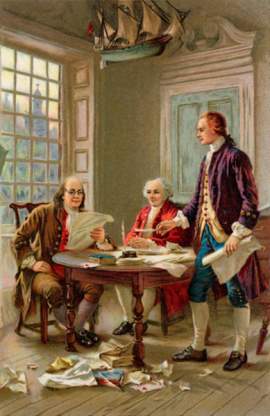
Understanding Writings on Representation and the Legislature

Popular In Constitution
Purpose Of Lifetime Appointment And Pros And Cons Enumerated Powers Bicameral Legislature Background Article 3 Of The Constitution We The People 1st Amendment Who Wrote The Constitution Judicial Review Equal Protection Clause 5th Amendment 10th Amendment Three Fifths Compromise
The precepts set forth by the Articles of Confederation rendered the American Government powerless to involve itself in matters concerning the individual legislation of any of the 13 states of the Union. Operating as individual, sovereign entities - as per the guidelines for the new American Government set forth by the Articles of Confederation - the 13 states of the Union were sanctioned to maintain their individual State legislative, or Congressional, bodies. Each individual and sovereign State was permitted to regulate all matters that took place within its border. As a result, amongst a nation of 13 states existed 13 separate Congressional bodies - a dynamic that nearly led to nationwide devastation.
Because no nationwide legislation existed, tariffs, trade rates, and all other taxable commercial ventures were subject to the discretion of the individual State’s Congress. Almost immediately, both domestic and international commerce came to halt as a result of erratic, and sometimes unpredictable, State-imposed tariffs and taxes. Certain states refused to engage in trade relations with others, and foreign nations were unwilling - or unable - to accommodate 13 different foreign policies.
A Federalist proposal - outlined in both the Federalist Papers, as well as The Constitution - that called for the creation of a nationally-consolidated American Government and Congress comprised of representatives from each of the 13 states of the Union was met with differing responses from each State.
Larger states with larger populations demanded their representation in the proposed national Congress to be commensurate with their respective populations. Conversely, smaller states were apprehensive about the possibility of having their sovereignty usurped in a legislative forum that would attribute power based on population. The populations of smaller states such as Rhode Island and Delaware could not have possibly competed with the population of larger states such as New York and Pennsylvania.
The Federalist Papers warned that without a nationwide Congress, the minorities could ostensibly control the majority. In order to illustrate this concern, James Madison postulated that according to the Articles of Confederation, at least 9 of the 13 states were required to pass a new piece of legislation. Therefore, 9 of the smaller states could establish an alliance in which they might all agree to vote unanimously in every Congressional hearing, thus swaying every election in the favor of the hypothetical 9-State alliance.
As a result, the Federalist Papers devised a system in which all states would be equally represented in a nationwide Congressional forum: each State, regardless of size, would be entitled to 2 senatorial representatives. This proposal not only prevented the establishment of any potential alliance, but also allowed for the equal treatment of every State in the Union.
As a result of the system of Congressional representation outlined in the Federalist Papers, every State, regardless of size, was represented equally. In addition, individual State legislation was re-modified as to avoid disproportionate tax and tariff rates. Larger states and their smaller counterparts would be neither penalized nor favored on account of their respective sizes.
NEXT: Federalist Papers





















